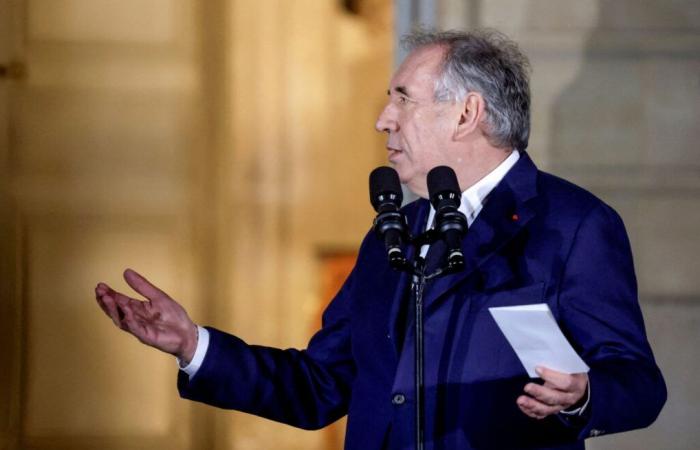
After a suspense which lasted until the very last minute, it was finally the centrist François Bayrou who was appointed prime minister to replace Michel Barnier, whose government fell last week under the influence of a motion of censorship. This is what the Élysée announced Friday early in the afternoon in a concise press release, after much hesitation and so many rumors.
Will this fourth prime minister in less than a year be able to last more than Michel Barnier’s three months? His appointment comes against the backdrop of an unprecedented political crisis under the Ve Republic, while no party has a majority in the National Assembly and the dissolution of last June makes a new legislative election impossible before next September.
“I know nothing about the Himalayas that stand before us,” declared the new prime minister in the courtyard of the Élysée, flanked by his predecessor. “No one knows the difficulty of the situation more than me,” he continued, before insisting on “the question of debt and deficits”, which poses “a moral problem”.
Without making any commitment, he promised to “hide nothing, neglect nothing and leave nothing aside.” Author of several books on Henry IV, he could not help but mention the man who put an end to the wars of religion and who, as if by chance, was born on December 13 in the town of Pau, of which François Bayrou is mayor. since 2014.
“A necessary dialogue”
The reactions were quick. In a rather conciliatory tone, the National Rally (RN), which brought down the previous government, announced that it will not “a priori” censor the new one. “The ball is now in the hands of François Bayrou. […] This new prime minister must take into consideration the new political situation, which makes dialogue necessary,” declared its president, Jordan Bardella. The president of the parliamentary group, Marine Le Pen, added that “any other policy which would only be an extension of macronism, rejected twice at the polls, could only lead to impasse and failure”.
“We always said we wouldn’t block. What matters is the roadmap,” declared Laurent Wauquiez, head of the Republican parliamentary group (LR).
On the left, the tone is much more offensive. Starting with that of La France insoumise (LFI), which denounces “a new arm of honor for democracy” and which will propose a new motion of censure as soon as possible. “After losing all the last elections, Macron installs his first and last support in Matignon. Bringing down Bayrou will therefore bring down Macron,” declared Jean-Luc Mélenchon’s right-hand man, Manuel Bompard.
In the Socialist Party (PS), which had demanded a left-wing prime minister, the reaction was more nuanced. In exchange for the commitment not to pass a law using article 49.3 of the Constitution, which makes it possible to avoid voting in the Assembly, the socialists could avoid any censorship. However, there is no question of joining the government. Those who do so could even be expelled from the party.
A scam
Obviously, the choice of François Bayrou was not easy. Exceptionally, on the very morning of his appointment, an astonishing imbroglio took place at the Élysée. From 8:30 a.m., Emmanuel Macron and his candidate had an interview that was virile to say the least, in which the latter allegedly set his conditions, even forcing the French president to question his choice. Faced with threats from the man who is also president of the Democratic Movement (MoDem) to leave the Macronian coalition, he would have changed his mind.
This is why we had to wait several hours, during which the craziest rumors circulated, for the nomination to finally be announced.
However, François Bayrou was one of Emmanuel Macron’s very first supporters. We could even say that in 2017, without his withdrawal before the first round, the young surprise candidate from the world of finance would have had no chance of accessing the Élysée. Bayrou will be appointed Keeper of the Seals (Minister of Justice), but for only 34 days, since he was caught up in accusations of fictitious employment. A saga that lasted seven years.
An old hand in politics, Bayrou has for years been a good-natured centrist, who was an unsuccessful candidate in the presidential election three times. This Béarnais is renowned for his tenacity, his anger and a certain versatility. He is attributed with a slight leaning to the left, since on two occasions he called for voting for socialist candidates for the presidency, which created strong enmities for him on the right.
A former professor of classics, he was Minister of Education and was one of the first to defend the idea of prohibiting students from wearing ostentatious religious symbols. In 1994, when he wanted to increase funding for private schools, he brought a million people into the streets. In 2022, when Marine Le Pen was threatened by not having enough sponsorships to run in the presidential election, he did not hesitate to sponsor her in order to “save democracy”, he said.
Which government?
His first mission will be to pass a budget and reconcile the elected representatives of the PS, LR and RN, a task on which his predecessor broke his teeth. Until then, the composition of his government will not be easy either. In the absence of left-wing figures, he will have to fall back on the center and the moderate right. We were wondering in particular whether Bruno Retailleau, the former minister who particularly stood out in the Interior, will be part of the new team.
Concerning the political crisis raging in France, the dean of French political columnists, Olivier Duhamel, affirmed on France Culture that “the Ve République has never even remotely experienced such a terrible period.”
This appointment comes as Emmanuel Macron’s unpopularity is about to beat the record reached by François Hollande. Barely 6% of French people wanted a prime minister from the central bloc and 63% said they were in favor of the president’s resignation in the event of government censorship.





